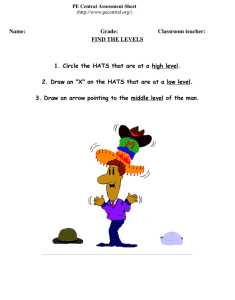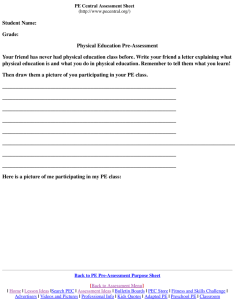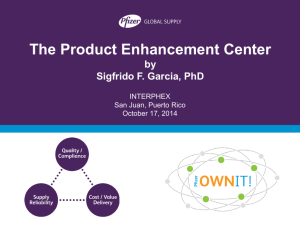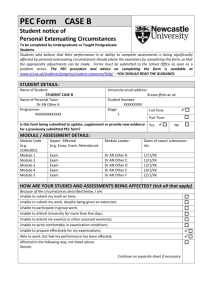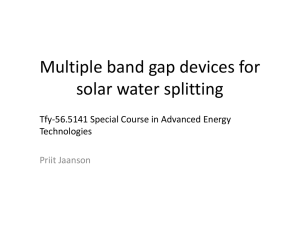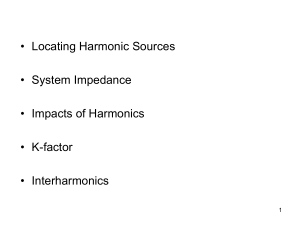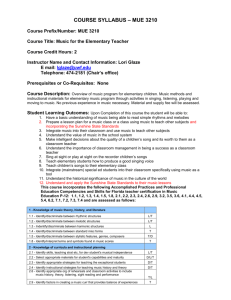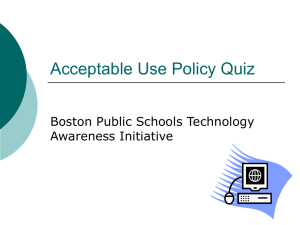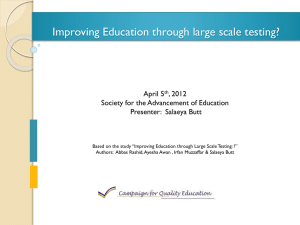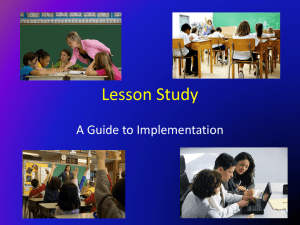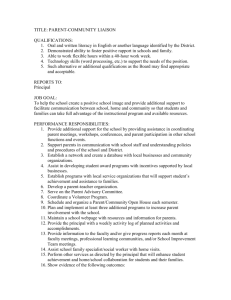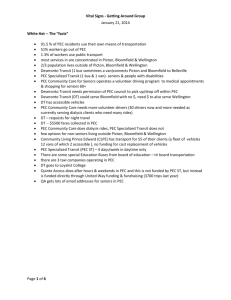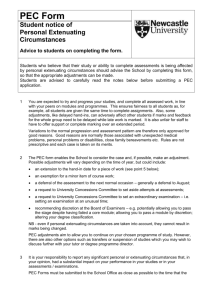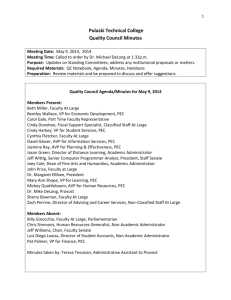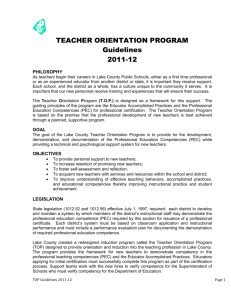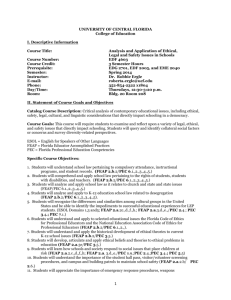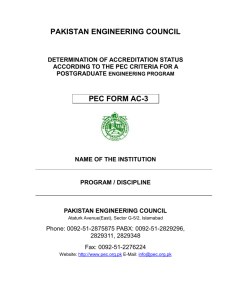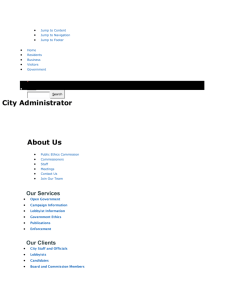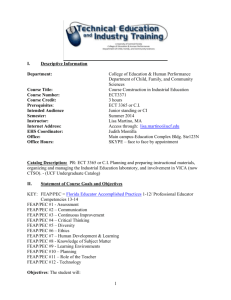MUE4330 Music in the Middle and Secondary Schools
advertisement
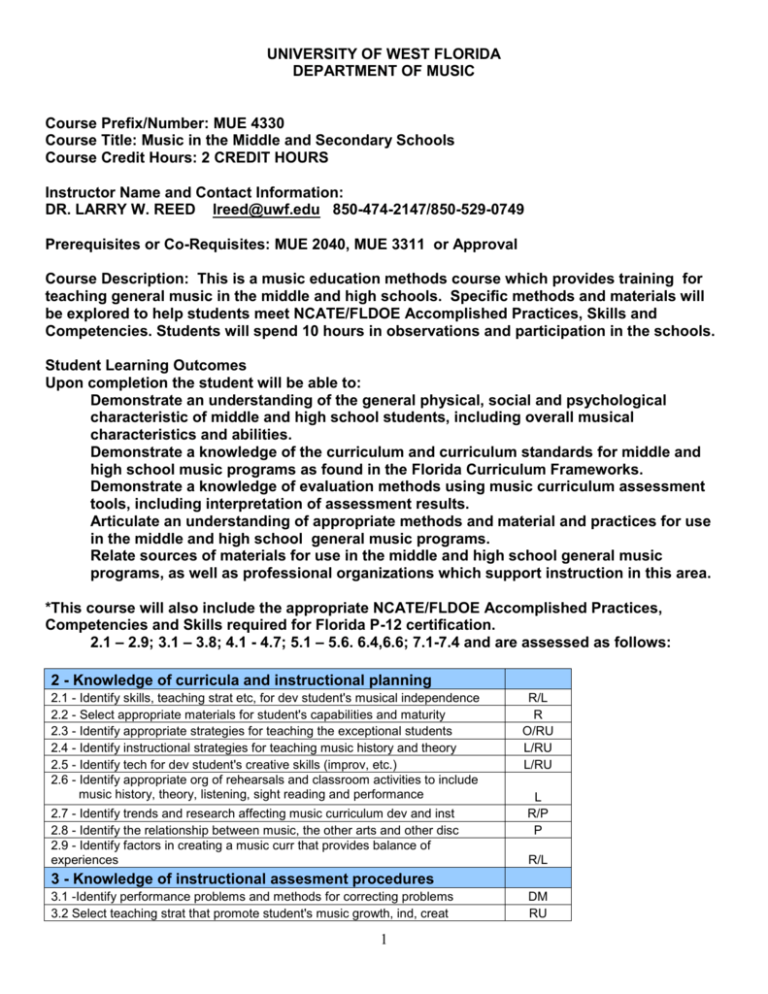
UNIVERSITY OF WEST FLORIDA DEPARTMENT OF MUSIC Course Prefix/Number: MUE 4330 Course Title: Music in the Middle and Secondary Schools Course Credit Hours: 2 CREDIT HOURS Instructor Name and Contact Information: DR. LARRY W. REED lreed@uwf.edu 850-474-2147/850-529-0749 Prerequisites or Co-Requisites: MUE 2040, MUE 3311 or Approval Course Description: This is a music education methods course which provides training for teaching general music in the middle and high schools. Specific methods and materials will be explored to help students meet NCATE/FLDOE Accomplished Practices, Skills and Competencies. Students will spend 10 hours in observations and participation in the schools. Student Learning Outcomes Upon completion the student will be able to: Demonstrate an understanding of the general physical, social and psychological characteristic of middle and high school students, including overall musical characteristics and abilities. Demonstrate a knowledge of the curriculum and curriculum standards for middle and high school music programs as found in the Florida Curriculum Frameworks. Demonstrate a knowledge of evaluation methods using music curriculum assessment tools, including interpretation of assessment results. Articulate an understanding of appropriate methods and material and practices for use in the middle and high school general music programs. Relate sources of materials for use in the middle and high school general music programs, as well as professional organizations which support instruction in this area. *This course will also include the appropriate NCATE/FLDOE Accomplished Practices, Competencies and Skills required for Florida P-12 certification. 2.1 – 2.9; 3.1 – 3.8; 4.1 - 4.7; 5.1 – 5.6. 6.4,6.6; 7.1-7.4 and are assessed as follows: 2 - Knowledge of curricula and instructional planning 2.1 - Identify skills, teaching strat etc, for dev student's musical independence 2.2 - Select appropriate materials for student's capabilities and maturity 2.3 - Identify appropriate strategies for teaching the exceptional students 2.4 - Identify instructional strategies for teaching music history and theory 2.5 - Identify tech for dev student's creative skills (improv, etc.) 2.6 - Identify appropriate org of rehearsals and classroom activities to include music history, theory, listening, sight reading and performance 2.7 - Identify trends and research affecting music curriculum dev and inst 2.8 - Identify the relationship between music, the other arts and other disc 2.9 - Identify factors in creating a music curr that provides balance of experiences R/L R O/RU L/RU L/RU L R/P P R/L 3 - Knowledge of instructional assesment procedures 3.1 -Identify performance problems and methods for correcting problems 3.2 Select teaching strat that promote student's music growth, ind, creat 1 DM RU 3.3 - Read, Interpret, and identify appropriate tech for conducting music 3.4 - Make critical judgements about expressive qualities of music perf 3.5 - Identify techniques for assessing and evaluating student progress 3.6 - Eval the effectiveness of music instruc in terms of content, process, and teacher self-evaluation 3.7 Select strategies for implementing technology in music instruction 3.8 - Identify qualities of music performance: tone quality, phrasing, blend DM DM R/D RU L RU 4- Knowledge of professional and instructional resources 4.1 - Identify resources and technology for instructional purposes 4.2 - Select acoustic and electronic music for instructional purposes 4.3 - Identify and select appropriate computer hardware for admin and instruction 4.4 - Identify techniques and resources for advocating music ed and generating community support 4.5 - Identify legal and ethical issues that impact music ed 4.6 - Identify resources availablethrough pro org, music industry, and publications 4.7 - Identify procedures for student selection, recruitment, retention, including feeder articulation and placement in appropriate music courses R/DM R/P R/DM R/D R/P R/D R 5 - Kowledge of instructional emphasis: choral 5.1 - Identify basic vocal diction tech in different languages 5.2 - Identify problems of ind vocal production and determine corrections 5.3 - Identify practices in the care and maintenance of the vocal mech 5.4 - Classify vocal char and ranges at various levels of dev and maturation 5.5- Identify representative solo and small/large ensembles at various levels 5.6 - Identify musical problems in ensemble performance and corrections L R/P R R R/P L/DM 6 - Kowledge of instructional emphasis: instrumental 6.4 - Identify musical prob in ens perf and determine methods of correction 6.6 - Identify practices in the care and maintenance of inst and accessories R/P RU 7 - Knowledge of instructional emphasis: general music 7.1 - Identify appropriate materials and rep for use at various levels 7.2 - Identify practices in the care and maintaenance of classroom inst 7.3 - Identify methods for incorporating creative movement in music inst 7.4 - Identify techniques for teaching students how to play classroom inst R/P R/P R/P R/P KEY: D=DISCUSSION DM=DEMONSTRATION L=LESSON PLAN O=OBSERVATION P=PROJECT R=RESEARCH PROJECT RU=RUBRIC This course addresses the following FEAP/PECs (with performance indicators) and are assessed as follows: FEAP/PEC Assessment/PEC 1 1.9. Maintains observational and anecdotal records to monitor students' development. L Communication/PEC 2 2.1. Establishes positive interaction in the learning environment that uses incentives 2 L and consequences for students. 2.4. Encourages students in a positive and supportive manner. 2.5. Communicates to all students high expectations for learning. 2.6. Acquires and adapts interaction routines (e.g., active listening) for individual work, cooperative learning, and whole group activities. 2.7. Provides opportunities for students to learn from each other. 2.9. Provides opportunities for students to receive constructive feedback on individual work and behavior Continuous Improvement/PEC 3 3.3. Uses data from her/his own learning environment as a basis for reflecting upon and experimenting with personal teaching practices. L Critical Thinking/ PEC 4 4.2.Identifies strategies, materials, and technologies which she/he will use to expand students' thinking abilities 4.4.Poses problems, dilemmas, and questions in lessons. 4.10. Uses technology and other appropriate tools in the learning environment. L Diversity/PEC 5 5.5. Has a repertoire of teaching techniques and strategies to effectively instruct all students. 5.9. Selects and introduces materials and resources that are multicultural. L Diversity/PEC 5 6.4.Takes reasonable precautions to distinguish between personal views and those of any educational institution or organization with which the individual is affiliated. 6.5.Does not intentionally distort or misrepresent facts concerning an educational matter in direct or indirect public expression. L/LDP 6.7.Maintains honesty in all professional dealings. Human Development and Learning/PEC 7 7.1. Recognizes developmental levels of students and identifies differences in a group of students. 7.2. Uses previously acquired knowledge to link new knowledge and ideas to already familiar ideas 7.5. Varies activities to accommodate different student learning needs, developmental levels, experiential backgrounds, linguistic development, and cultural heritage. L Knowledge of Subject Matter/PEC 8 8.1. Communicates knowledge of subject matter in a manner that enables students to learn. 8.2. Increases subject matter knowledge in order to integrate the learning activities. 8.3. Uses the materials and technologies of the subject field in developing learning activities for students. L Learning Environment/PEC 9 9.9. Monitors learning activities by providing feedback and reinforcement to students. 9.11. Arranges and manages the physical environment to facilitate student learning outcomes. L Planning/ PEC 10 10.1.Identifies student performance outcomes for planned lessons. 10.2. Plans and conducts lessons with identified student performance and learning outcomes. L Role of the Teaching/PEC 11 11.2.Provides meaningful feedback on student progress to students and families and seeks assistance for self and families. L Technology/PEC 12 12.5. Uses technology in lesson and material preparation. 12.9.Selects and utilizes educational software tools for instructional purposes based upon reviews and recommendations of other professionals. 3 L Key: E=Essay L=Lesson Plan LDP=Learner Development Project Students will create learner development project which will be uploaded to the TK20 system as part of your program assessment and readiness to be an Empowered Professional Making a Difference. You will create a PowerPoint which describes the characteristics (physical, social, emotional, intellectual development, cultural characteristics, and learning disabilities) of the students you would like to teach. This is an opportunity for you to learn specific information related to the students you intend to teach and the general characteristics of your future students. You need to choose one of the following for your area of concentration: General Music in middle school or general music in high school. You will describe the characteristics of these students in a way that both you and I have a better understanding of the children you will be working with and how to best teach the general population of students given their characteristics. You will include an aspect of the historical and sociological perspective with respect to current practices in education. Students will create a sample lesson plan for middle school or high school general music, music appreciation, or music theory. The plan will include materials, objectives, procedures, assessment, and NGSSS. Topics Covered to include: An overview of the middle and high school student’s general physical, social and psychological characteristics; An overview of the middle and high school student’s musical and performing characteristics; Florida and NCATE Accomplished Practices and the Sunshine State Standards as they relate to the implementation of middle and high school general music education program; Curriculum evaluation practices and interpretation in middle and high school music education programs, as a reflection of the Florida Curriculum Frameworks, FCAT ; state assessments and their connection to local assessment instruments and practices; Resources for teaching in the middle and high school music education program and the state and national organizations which support these programs. Texts: Thomas A.Regelski :Teaching General Music in Grades 4-8 A Musicianship Approach Oxford University Press 2004 ISBN: 13: 9780195137781 Author: Patricia Shehan Campbell: Teaching Music Globally: Experiencing Music, Expressing Culture, Thinking Musically. Oxford University Press 2004 ISBN: 13: 9780195171433 Florida Curriculum Frameworks Grading / Evaluation: 4 CLASS PARTICIPATION/ATTENDANCE 20% ASSIGNED PROJECTS 20% LESSON PLAN 10% LEARNER DEVELOPMENT PROJECT 10% OBSERVATIONS AND COMPLETED REPORTS 30% RESOURCE NOTEBOOOK COMPLETION (includes sample lesson plans) 10% Grading scale: A = 93 – 100 A- = 90 – 92 B+ = 87 – 89 B = 83 – 86 B- = 80 – 82 C+ = 77 – 79 C = 73 – 76 C- = 70 – 72 D+ = 67 – 69 D = 60 - 66 F = BELOW 60 Special Technology Utilized by Students: Computer and access to internet. Academic Conduct/Plagiarism Policy: As members of the University of West Florida, we commit ourselves to honesty. As we strive for excellence in performance, integrity—personal and institutional—is our most precious asset. Honesty in our academic work is vital, and we will not knowingly act in ways which erode that integrity. Accordingly, we pledge not to cheat, nor to tolerate cheating, nor to plagiarize the work of others. We pledge to share community resources in ways that are responsible and that comply with established policies of fairness. Cooperation and competition are means to high achievement and are encouraged. Indeed, cooperation is expected unless our directive is to individual performance. We will compete constructively and professionally for the purpose of stimulating high performance standards. Finally, we accept adherence to this set of expectations for academic conduct as a condition of membership in the UWF academic community. ASSISTANCE: Students with special needs who require specific examination-related or other courserelated accommodations should contact Barbara Fitzpatrick, Director of Disabled Student Services (DSS), and (850) 474-2387. DSS will provide the student with a letter for the instructor that will specify any recommended accommodations. REVISED: 01/12/09 5
